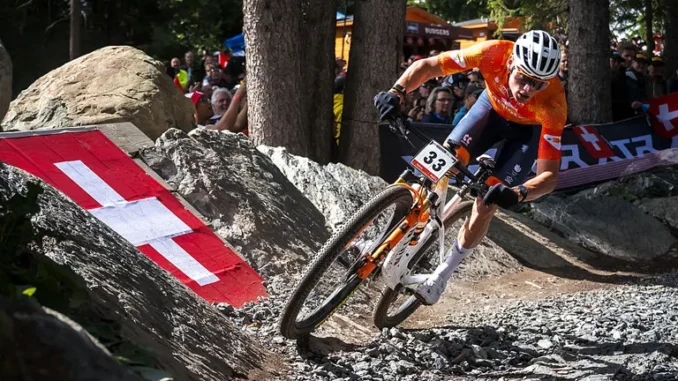
Mathieu van der Poel Fades in Mountain Bike World Championships as Alan Hatherly Retains Men’s XCO Title
For all of his brilliance across road, cyclo-cross, and mountain biking, Mathieu van der Poel entered the 2025 Mountain Bike World Championships with expectations that bordered on mythical. The Dutch superstar has never shied away from crossing disciplines, and with his explosive power and tactical mastery, many thought he could add another world title to his resume. But Sunday’s men’s cross-country Olympic (XCO) final told a different story.
It was Alan Hatherly of South Africa who showed consistency, grit, and tactical awareness, storming to retain his world crown and cement his place as the rider to beat in modern XCO racing. Van der Poel, despite a strong opening and waves of support from fans, faded in the decisive laps and ultimately fell out of contention. The result was both a triumph for Hatherly and a reminder of just how demanding mountain biking’s premier event truly is.
The Build-Up: A Clash of Disciplines
Van der Poel’s return to mountain biking was one of the most talked-about storylines of this year’s championships. After dominating the spring Classics and showcasing his versatility on the road, he circled the Worlds as a chance to reignite his off-road roots. He had hinted at chasing Olympic glory in Paris in 2024, and while injury derailed that campaign, the World Championships offered a chance for redemption.
Alan Hatherly, meanwhile, arrived as the reigning world champion, riding a wave of confidence after a stellar World Cup season. Known for his smooth handling, aerobic depth, and tactical patience, the South African had already proven that his first world title was no fluke. With rivals like Tom Pidcock focusing elsewhere, Hatherly’s biggest threat appeared to be van der Poel’s explosiveness—until the race itself revealed the deeper truth.
How the Race Unfolded
From the start, the Men’s XCO final unfolded at a furious pace. Van der Poel launched aggressively, drawing cheers from the Monte Tamaro crowd as he pushed to the front and looked eager to test his rivals. For the opening laps, his sharp accelerations split the peloton and kept Hatherly and others on alert.
But mountain biking, unlike the shorter bursts of cyclo-cross or the structured rhythms of road racing, demands sustained precision on rugged climbs and technical descents. By lap three, the strain began to show. Van der Poel’s accelerations grew less frequent, and his lines through the most technical sections were just slightly less fluid than Hatherly’s.
Sensing opportunity, Hatherly struck. He didn’t attack in one dramatic moment; instead, he increased the tempo relentlessly, grinding through the climbs and daring others to match his pace. Riders fell back one by one. Van der Poel hung on through the mid-race laps but gradually slid out of the front group.
By the penultimate lap, Hatherly had carved out a decisive lead. His rhythm never faltered, his bike handling looked effortless, and his ability to maintain high cadence on steep inclines proved insurmountable. Van der Poel, meanwhile, slipped into survival mode, grimacing as he tried to fend off chasers behind.
Hatherly’s Historic Retention
Crossing the finish line alone, Hatherly celebrated not just a victory but the rare achievement of retaining the men’s XCO world title. Mountain biking’s unpredictability often makes repeat champions elusive, but the South African has now carved his name into history.
“I knew it would take patience and control today,” Hatherly said post-race. “Mathieu is always dangerous, and I respected what he could do. But this course rewarded consistency, and I trusted my preparation. To win again, it means everything.”
For South Africa, the moment carried broader significance. Cycling has often been dominated by European nations, but Hatherly’s success has given the sport a global hero and inspired a generation of African riders.
Van der Poel’s Struggles: A Reality Check
For van der Poel, the disappointment was clear. After such a promising start, fading out of contention raised questions about whether his focus across multiple disciplines may have stretched him thin.
“I gave everything, but I couldn’t keep the pace in the end,” van der Poel admitted. “Mountain biking at this level is unforgiving. I wanted to win, but sometimes the body says no. I respect Alan—he was the strongest today.”
This isn’t the first time van der Poel has faced heartbreak on the mountain bike stage. His crash in the 2021 Olympics still lingers in memory, and while he remains one of cycling’s most versatile figures, sustaining dominance across road, cyclo-cross, and mountain biking may simply be beyond human limits.
Implications for the Future
Hatherly’s triumph underscores a new era in XCO racing, one defined by precision and patience rather than brute force. His ability to outlast a rider of van der Poel’s caliber sends a message: the sport belongs to specialists who master the nuances of endurance and technical riding.
For van der Poel, the result may prompt a reconsideration of priorities. With the road season demanding so much energy, and with cyclo-cross always looming in the winter, perhaps mountain biking will again become a passion project rather than a career-defining goal.
Yet fans should not count him out. His sheer talent means he can always mount a challenge, and if he dedicates himself fully to an Olympic run, he remains dangerous.
Conclusion: A Day for Hatherly, A Lesson for Van der Poel
The 2025 Mountain Bike World Championships will be remembered less for van der Poel’s fade than for Alan Hatherly’s brilliance. Retaining the world title is a testament to his preparation, resilience, and ability to thrive when others faltered.
Van der Poel, as always, remains a captivating figure—his ambition pulling him across disciplines, sometimes to glory, sometimes to disappointment. But Sunday in Monte Tamaro was Hatherly’s day. A day when patience triumphed over power, when consistency outlasted explosiveness, and when mountain biking crowned a repeat king.

Leave a Reply